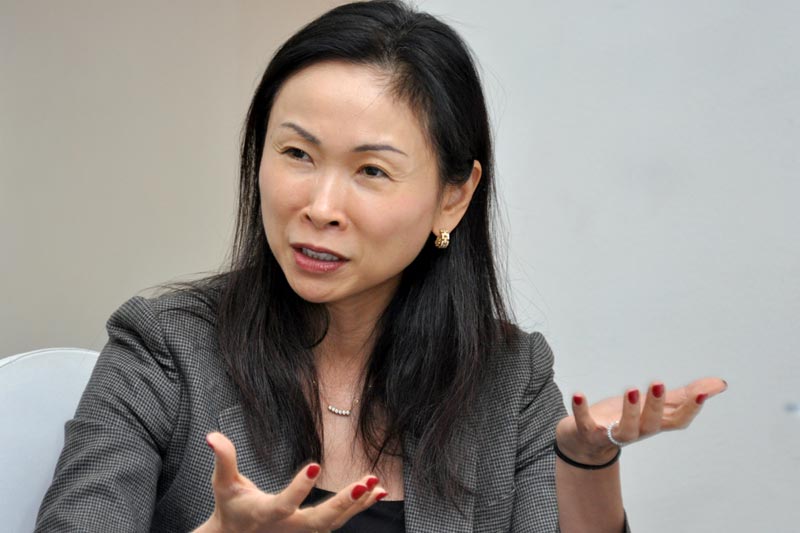Wednesday Feb 18, 2026
Wednesday Feb 18, 2026
Monday, 20 May 2024 03:47 - - {{hitsCtrl.values.hits}}

Citi’s Global Head of Emerging Market Economics, Johanna Chua – Pic by Lasantha Kumara
By Nisthar Cassim
With Sri Lanka achieving much-needed stability, Citi’s Global Head of Emerging Market Economics, Johanna Chua last week stressed the importance of focusing on growth-enhancing reforms if the country were to overcome ongoing challenges.
She said such a course is essential to boost private sector investment. Growth enhancing reforms also includes further opening up of Sri Lanka and its markets, she added. “Stability was essential even though it came at a cost. Then there is also an issue of whether people feel it (stability). For this, and given the traditional weaknesses in the economy, the country needs to generate growth,” she added.
“There is a re-rating story in Sri Lanka. There is a lot of opportunity provided Sri Lanka continues on the reforms path as well as growth. Sri Lanka cannot afford to remain as a setback nation. The best balance is to build stabilisation with growth enhancing reforms so that you can continue both, she said.
Chua was in Sri Lanka along with a group of Citi’s clients cum investors from Europe, Middle East and Asia whom she said are upbeat too. Some of the investors include holders of Sri Lanka’s International Sovereign Bonds (ISBs) who according to Chua were also exploring opportunities in local Government bonds.
“Investors are seeing a lot of growth opportunities in Sri Lanka. There’s so much potential. If the economy can grow fast, especially on a sustainable basis, then there will be an inflow of investments and funds,” Citi’s Global Head of Emerging Market Economics emphasised.
“Overall there’s definitely been a lot of tangible improvement on the back of stabilisation in Sri Lanka as well as on the IMF program,” said Chua who welcomed Sri Lanka’s achievement on lowering inflation, primary surplus, boosting Government revenue as well as foreign reserves. “The pace at which stability was achieved was a surprise. The Government and the people really took a lot of pain,” she added.
“The reform momentum is very positive under the leadership of President Ranil Wickremesinghe who is keen to institutionalise and legalise the reforms already completed,” she emphasised.
The concern of Citi’s as well as global investors in the short term remains the election cycle in Sri Lanka and whether the country will slow down on the reform process already committed to under the IMF program. An early conclusion of an agreement with private creditors of Sri Lanka is also being eagerly looked after. ”There were expectations that external debt restructuring would happen a little faster but it has taken longer but to be fair it is not unique to Sri Lanka,” she quipped. An undue delay means Sri Lanka’s risk profile and assumptions are required to be revisited and readjusted.
However, Chua said in Sri Lanka, unlike in other places, elections can really be a massive opportunity as it is a very genuine democracy. In that context she expressed the hope that the reform momentum will continue.
Noting that revenue-based fiscal consolidation is really the crux of the IMF program, Chua said the revenue effort needs further boost with improved administration via digitisation.
According to her, among the good news for Sri Lanka is India and growing optimism among global investors. She recommends Sri Lanka stand to gain by plugging into India’s supply chain. “Sri Lanka has this once in a lifetime opportunity where Sri Lanka now has to find a way to latch on to that growth and find linkages that can capitalise on the opportunities despite challenges.”
For example, the reason why Vietnam is such a success is because it is also super linked to China’s supply chain.
There’s opportunity, and Sri Lanka needs to find a niche within linking to India to a certain extent. Perhaps Sri Lanka’s greater opportunity lies in services and there must be more value addition. Same goes to tourism given the fact that Sri Lanka is a beautiful country. BPO services and medical services are some of the other opportunities for Sri Lanka.
“From a geographic standpoint, Sri Lanka is in a good region. The question is leveraging that. This also means greater opening up, deregulating, opening up the private sector as Sri Lanka is a smaller country,” she emphasised.
